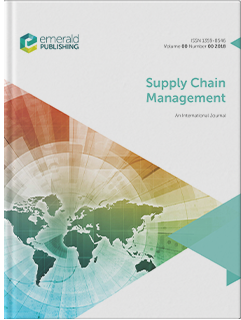技术与供应链绩效之间的联系:利益、权力和风险降低
IF 8.4
3区 管理学
Q1 BUSINESS
Supply Chain Management: An International Journal
Pub Date : 2023-10-11
DOI:10.1108/scm-03-2023-0131
引用次数: 0
摘要
本文的目的是评估工业4.0区块链和工业物联网技术(IIoT)技术对与电力、利益和风险降低相关的供应链联系发展的综合影响,以及这种联系对供应链绩效的最终影响。设计/方法/方法将区块链和工业物联网作为供应链权力、利益和风险降低联系的先决条件,以及这些联系作为供应链绩效的先决条件的结构模型理论化。从303名美国制造经理收集的数据使用基于协方差的结构方程建模(CB/SEM)方法进行分析。CB/SEM结果表明,区块链技术不会直接影响这些联系的实施。相反,区块链技术的实施支持工业物联网技术的实施,从而加强供应链联系,从而提高供应链绩效。据作者所知,本研究是第一个提供经验证据的研究之一,证明工业4.0技术(如区块链和工业物联网)加强了供应链合作伙伴之间与权力、利益和风险降低相关的联系,而这些更强的联系会提高供应链绩效。应该指出的是,这项研究是基于仅代表一个部门(制造业)和一个国家(美国)的管理人员的数据。需要根据其他部门和国家的数据进行复制,以支持结果的推广。实践意义为从业者提供了经验证据,证明区块链和工业物联网等工业4.0技术的实施支持供应链管理。这些技术促进了供应链合作伙伴之间的数据和信息共享,从而实现了整个供应链中业务流程的集成和协调。当供应链的合作伙伴高效而有效地协同工作时,供应链的最终客户将受益。区块链和工业物联网数字技术的实施可以改善供应链合作伙伴之间的联系,从而提高效率和效益,从而使客户和社会受益。原创性/价值工业4.0技术相对较新,有望改善供应链绩效。基于本研究的结果,证明了工业4.0技术作为增强信息共享机制的有效性。本文章由计算机程序翻译,如有差异,请以英文原文为准。
Linkages between technologies and supply chain performance: benefits, power and risk reduction
Purpose The purpose of this paper is to assess the combined impact of the Industry 4.0 blockchain and industrial internet of things technology (IIoT) technologies on the development of supply chain linkages associated with power, benefits and risk reduction and the ultimate impact of the linkages on supply chain performance. Design/methodology/approach A structural model with blockchain and IIoT as antecedents to the supply chain power, benefits and risk reduction linkages and the linkages as antecedent to supply chain performance is theorized. Data collected from 303 US manufacturing managers are analyzed using a covariance-based structural equation modeling (CB/SEM) methodology. Findings The CB/SEM results indicate that blockchain technology does not directly impact implementation of the linkages. Rather, implementation of blockchain technology supports implementation of IIoT technology, which strengthens supply chain linkages, thereby improving supply chain performance. Research limitations/implications To the best of the authors’ knowledge, this study is one of the first to provide empirical evidence that Industry 4.0 technologies such as blockchain and IIoT strengthen linkages among supply chain partners related to power, benefits and risk reduction and that those stronger linkages lead to improved supply chain performance. It should be noted that this study is based on data from managers representing only one sector (manufacturing) and one country (USA). Replication based on data from other sectors and countries is needed to support generalization of the results. Practical implications Practitioners are provided with empirical evidence that the implementation of Industry 4.0 technologies such as blockchain and IIoT support supply chain management. These technologies facilitate data and information sharing among supply chain partners, enabling the integration and coordination of business processes throughout the entire supply chain. Social implications The ultimate customers of supply chains benefit when supply chain partners work together efficiently and effectively. The implementation of blockchain and IIoT digital technologies lead to improve linkages among supply chain partners driving improvements in both efficiency and effectiveness, thus benefiting customers and society. Originality/value Industry 4.0 technologies are relatively new with the promise of improved supply chain performance. The efficacy of Industry 4.0 technologies as mechanisms to enhance information sharing is demonstrated based on the results of this study.
求助全文
通过发布文献求助,成功后即可免费获取论文全文。
去求助
来源期刊
CiteScore
16.70
自引率
5.70%
发文量
27
期刊介绍:
Supply Chain Management (SCM) is a journal that places great emphasis on research findings with international relevance and global impact, benefitting both theory and practice. To be considered for publication, research papers and case studies submitted to SCM must contribute to extending supply chain knowledge beyond a dyadic perspective.
The journal focuses specifically on empirical research and does not accept submissions related to modelling or simulation. This is because the challenges posed by globalization and rapidly evolving technology trends have a direct impact on supply chain design and management. Therefore, it is essential for contemporary supply chain practices to be responsive, proactive, integrated, and driven by information when managing the various components of the supply chain.

 求助内容:
求助内容: 应助结果提醒方式:
应助结果提醒方式:


